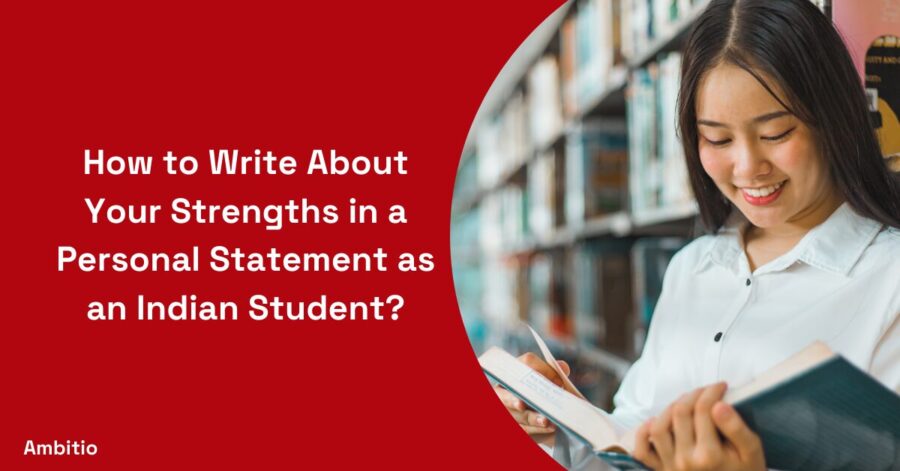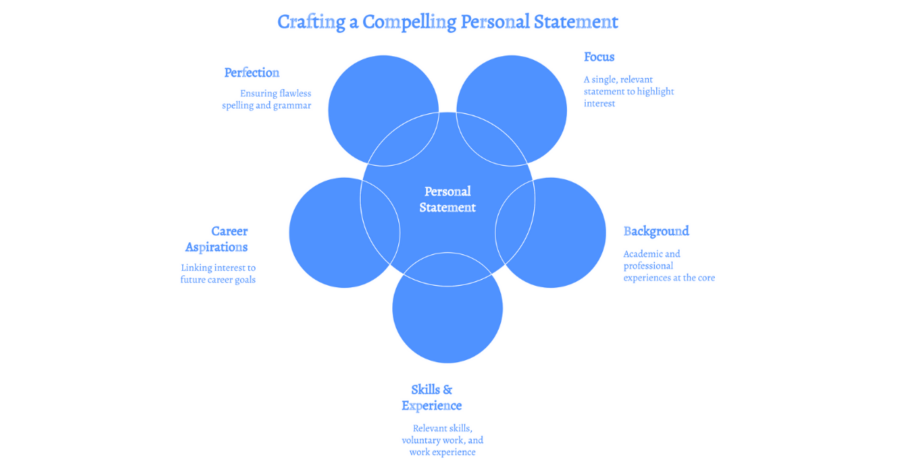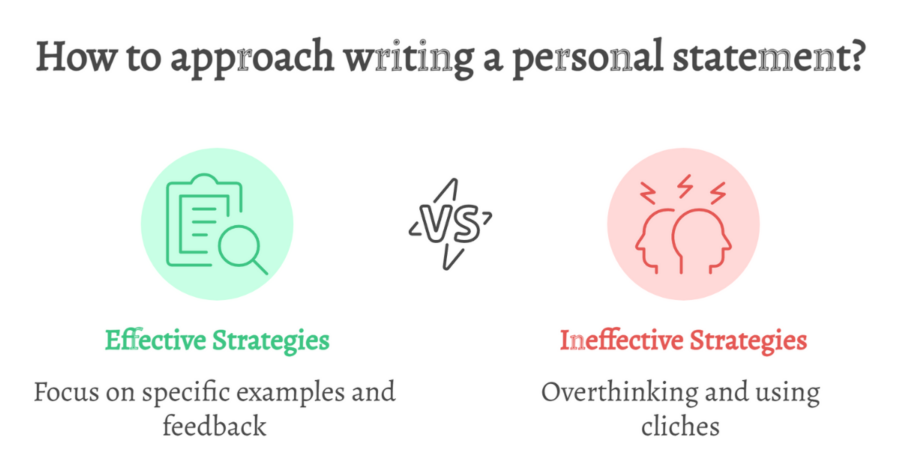8 May 2025
5 minutes read
How to Write About Your Strengths in a Personal Statement as an Indian Student (Examples of Strengths and Weaknesses)?

Key Takeaways
- How to write about your strengths in a personal statement: Use concrete examples to demonstrate your strengths and connect them to your goals.
- How to write about your strengths in a personal statement: Align your skills and experiences with what the program values most.
- How to write about your strengths in a personal statement: Show self-awareness and growth by discussing challenges you’ve overcome.
Making your personal statement stand out from the crowd may sound tough, but the good news is—you already have what it takes. As an Indian student applying to a graduate program, college application or even facing job interviews, your background, experiences and culture bring something unique to the table.
This article will show the admissions committee exactly how to notice that. Whether you’re writing a personal statement or a statement of purpose, you will learn how to highlight your strengths and demonstrate your strengths effectively. Let’s explore tips to help make your statement clear and concise, full of concrete examples, and deeply personal and professional in tone.
What are Strengths and Weaknesses in a Personal Statement and Statement of Purpose?
Strengths and weaknesses can help your personal and professional narrative feel more authentic. Your statement should reflect self-awareness, not just a long list of strengths. Schools value honest, reflective applicants who show personal and professional growth.

Discussing your strengths shows what you bring to the program, while addressing weaknesses reveals your growth mindset. A strong statement includes both personal and academic qualities that are relevant to the role or field of study. Instead of fluff, focus on relevant skills and experiences, and always show the admissions committee why you are suited to the role.
How Do Universities and Grad Schools Ask About Strengths and Weaknesses in a Personal Statement?
Fun fact: Many grad school prompts don’t directly ask about strengths and weaknesses, but they expect you to reveal them! That’s why writing your statement thoughtfully becomes a strategic move.
Here’s how they typically ask about strengths and weaknesses:
- “Tell us about a challenge you faced and how you overcame it.”
- “What are your long-term goals, and how has your background prepared you?”
- “Discuss a personal or academic experience that shaped your career goal.”
- “Describe your greatest strengths that will help you succeed in this program.”
- “Highlight your strengths and explain how they relate to your future career.”
What are Some Examples of Strengths and Weaknesses in a Personal Statement?
Fun fact: Quick learners with strong communication skills often get noticed not only in job interviews but also in school applications. Talking about your strengths does not mean sounding arrogant—just honest and thoughtful.
Here are examples to consider:
Strengths
- Communication skills
- Quick learner
- Self-reflection ability
- Presentation skills
- Adaptability
Weaknesses
- Public speaking fear
- Time management lapses
- Perfectionism
- Hesitation in group settings
- Overcommitting
| Strengths | Weaknesses |
|---|---|
| Strong communication | Difficulty with time management |
| Fast learner | Nervous during presentations |
| Adaptability | Perfectionist tendencies |
| Problem-solving skills | Struggles delegating tasks |
| Leadership experience | Fear of public speaking |
How to Highlight Your Strengths and Weaknesses in Your Personal Statement?
Fun fact: Telling a story works better than listing qualities. Applicants who write about strengths through real-life moments often leave a lasting impact.

To highlight your strengths and weaknesses:
- Show the acceptance committee real situations—don’t just describe yourself.
- Provide examples that are relevant to the role or program.
- Discussing their strengths with concrete stories shows a growth mindset.
- Explain how a weakness turned into a lesson or opportunity.
- Focus on how you demonstrate your strengths in both personal and professional contexts.
Personal Statement Example With Three Strengths: Greatest Strengths to Get Accepted
Given below is a sample statement that includes three strengths and reflects personal and professional growth. It illustrates how students can answer questions that ask about strengths and weaknesses effectively.
Sample Personal Statement:
I’m Riya Mehta, and I’m applying for the Master’s in Public Policy at the University of California, Berkeley. My journey from a small town in Gujarat to a national policy fellowship in Delhi reflects my biggest strengths: adaptability, communication, and self-awareness.
Back in school, I never thought my voice could influence change. But when I participated in the Model United Nations during my undergrad at Delhi University, I discovered a strength I never knew I had—public speaking. It wasn’t easy. I stammered, forgot my points, and even froze. But I kept at it. By the end of my final year, I won the Best Delegate award and found my passion for civic policy.
My second strength is adaptability. When the pandemic hit, I shifted my community outreach program online. I restructured team roles, adopted virtual presentation tools, and ensured that our NGO’s literacy initiative continued. This experience made me realize how vital it is to remain flexible during uncertainty.
The third strength I bring is self-awareness. I know I’m not perfect. My biggest weakness used to be my fear of failing in group discussions. I would rehearse lines in my head and forget to truly engage. Realizing this, I started volunteering as a debate moderator. This helped me overcome the fear and become more confident and engaged in team settings.
Berkeley’s emphasis on impact-driven research and real-world problem-solving fits my personality. I want to study public policy to develop community-led solutions for rural India. I believe my strengths, supported by my experiences, will allow me to make the most of this graduate program and grow both personally and professionally.
Top 10 Universities Where Your Personal Statement Stands at a Crucial Position?
Did you know your statement plays a decisive role at top global universities, sometimes weighing more than test scores like GRE or GMAT?
These schools expect self-reflection, clear goals, and strong storytelling.
| Sl. No. | Country | University | Fee (USD) | Statement Requirements | Programs Offered |
| 1 | USA | Stanford University | $57,000/year | Required for all graduate schools | Business, Law, Engineering, Education |
| 2 | UK | University of Oxford | £28,000/year | Required; SOP format preferred | Politics, History, Science, MBA |
| 3 | USA | Harvard University | $54,000/year | Strong statements essential | Public Policy, Medicine, Law, Education |
| 4 | UK | University of Cambridge | £27,000/year | Required with focused academic goals | English, Law, Engineering, History |
| 5 | USA | MIT | $53,000/year | Mandatory; creativity encouraged | Engineering, Computer Science, MBA |
| 6 | UK | London School of Economics (LSE) | £25,000/year | SOP with clear career goals | Economics, Law, Finance |
| 7 | USA | University of Chicago | $52,000/year | Statement must demonstrate your strengths | Sociology, Political Science, MBA |
| 8 | UK | King’s College London | £23,000/year | Strong focus on academic and professional goals | Law, Medicine, Business |
| 9 | USA | Columbia University | $60,000/year | Required; must discuss long-term goals | Journalism, Law, Public Affairs |
| 10 | UK | University of Edinburgh | £22,000/year | SOP should include strengths and weaknesses | Humanities, Computer Science, Education |
Conclusion
Writing your personal statement can feel overwhelming, especially when you’re unsure how to discuss your greatest strengths or areas for growth. But with a little self-reflection and planning, you can provide examples that speak volumes.
By showing your skills and experiences clearly, you demonstrate your strengths in a way that connects with the acceptance committee. Whether you’re applying to grad schools or professional programs, strong statements show you’re suited to the role and committed to personal and professional growth.
Avoid common mistakes and keep your narrative relevant, honest, and inspiring. Learn how to write with clarity, purpose, and heart—and your application materials will shine. Choose Ambitio and make your dreams come true!
FAQs
How to write about your strengths in a personal statement if you have limited experience?
When figuring out how to write about your strengths in a personal statement with limited experience, focus on qualities like adaptability, curiosity, and dedication.
How to write about your strengths in a personal statement without sounding arrogant?
To learn how to write about your strengths in a personal statement without sounding arrogant, use specific, humble examples that show rather than boast.
How to write about your strengths in a personal statement for grad school?
Understanding how to write about your strengths in a personal statement for grad school means matching your strengths to the school’s values and academic focus.
How to write about your strengths in a personal statement when addressing weaknesses too?
Mastering how to write about your strengths in a personal statement involves pairing them with growth moments from your weaknesses to show self-awareness.
How to write about your strengths in a personal statement for competitive universities?
To grasp how to write about your strengths in a personal statement for competitive universities, present standout skills that align with the program’s demands.
How to write about your strengths in a personal statement as a recent graduate?
If you’re learning how to write about your strengths in a personal statement as a recent graduate, highlight course projects, leadership roles, and your drive.
How to write about your strengths in a personal statement for international admissions?
Knowing how to write about your strengths in a personal statement for international admissions involves aligning personal traits with global learning and cultural fit.

You can study at top universities worldwide!
Get expert tips and tricks to get into top universities with a free expert session.
Book Your Free 30-Minute Session Now! Book a call now




























